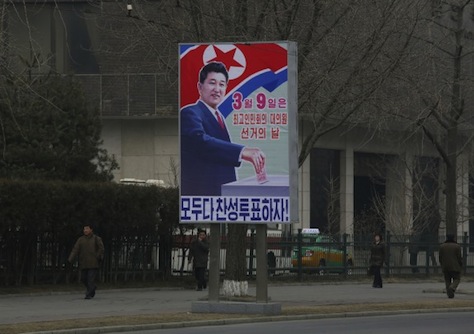There’s no country on the planet more autarkic or isolated than the Democratic People’s Republic of Korea.![]()
Last year, when Kim Jong-un decided to show that he was in charge, he executed his own uncle, Jang Song Thaek, who had been a top advisor to Kim’s father, Kim Jong-il. There’s no question that Dear Leader is running North Korea, however poorly he may be running it — it has a GDP of around $40 billion while South Korea has a GDP of $1.130 trillion.
But when North Korea holds elections on Sunday to determine the 687 members of the Supreme People’s Assembly (최고 인민 회의), voters will have just one choice — a candidate of the Workers’ Party of Korea (조선로동당), the long-governing party of North Korea. In some cases, voters may choose the candidate of either the Korean Social Democratic Party or the Chondoist Chongu Party, both of which govern in coalition with the Workers’ Party under the banner of the ‘Democratic Front for the Reunification of the Fatherland.’
Kim himself is standing in constituency #111 — an auspicious number! He will represent Mount Paekdu — how sacred!
Or whatever.
The Supreme People’s Assembly is certainly not the fount of power in North Korea; instead, it’s a rubber-stamp parliament that rarely even convenes.
Given the nature of power and government in North Korea, what could Kim possibly gain out of the expense and hassle of staging she elections? It’s not to gain a democratic mandate, because there’s no opposition (and there’s no way for North Korean voters to vote in secret against the government’s candidate). The elections are such a sham that they certainly aren’t being staged for showing the world that North Korea is acceding to the mechanisms of democratic legitimacy. I haven’t even listed North Korea’s election s on the 2014 electoral calendar because they so comically fall below the standards of anything we understand to be a valid election.
In contrast, elections for the Politburo Standing Committee of the Chinese Communist Party (中国共产党) in neighboring China seem like bona fide exercises in civic duty.
So what gives? There are at least three reasons why North Korea continues to go through the charade of holding ‘elections.’
It’s a census. With nearly 100% turnout (Dear Leader requires all citizens to participate — authorities reported 99.98% turnout in the oct recent 2009 elections), parliamentary elections serve as something like a census, as several Western reports have noted. In a country with 24.75 million people, the elections have served as a convenient way to gather information about North Korea’s population, at the national, regional and local levels, especially with such a porous border with the PRC:
Michael Madden, editor of the NK Leadership Watch website and a contributor to the 38 North news bulletin, said it reflects one reason the autocratic North has elections at all: They provide “the most comprehensive assessment of the population.”
Mustering the nation every so often is a chance for the authorities to hone their mobilization skills, check up on the efficiency of local leaders and get a snapshot of internal movements.
It’s a pure power play. If you ran a Stalinist dictatorship with a iron fist, wouldn’t you be tempted to demand that your citizens go through the ignominy of sham elections? By forcing every North Korean citizen to vote, and by essentially forcing every North Korea citizen to vote in favor of the government, it’s just another mechanism for Kim and the Workers’ Party to demonstrate total control.
It’s the mechanism to allocate power within the Workers’ Party. Much like in the People’s Republic of China, where elections to the Party’s National Congress, the Politburo and the Politburo Standing Committee are contested by factions within the party leadership, North Korean observers will be watching Sunday’s elections to see who will emerge as the top party leaders for signs of future influence. But even as CCP elections in China have become increasingly transparent as part of a clear system of distributing power within the PRC (witness the coverage both inside and outside China of the sensational trial of former Chongqing party boss Bo Xilai and of the selection of a new Standing Committee in November 2012), the role of elections in North Korea remains more opaque.
Photo credit to Vincent Yu / Associated Press.
